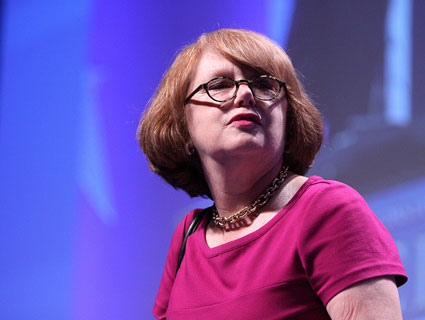
<a href="http://www.flickr.com/photos/gageskidmore/5452908272/">Gage Skidmore</a>/Flickr
Last Tuesday, a week after the Supreme Court’s ruling upholding Obamacare, Sally Pipes appeared before the House Oversight and Government Reform Committee to enumerate the evils of the law. The president of the Pacific Research Institute, a San Francisco-based free-market think tank, Pipes warned members of Congress that if they didn’t act quickly Americans would soon suffer the rationed care and long waits supposedly plaguing her native Canada. The country’s health care system, she insisted, had killed her mother by refusing to test her for colon cancer, which she later died from.
Pipes’ appearance on Capitol Hill, days before the House voted for the 33rd time to repeal Obamacare, capped a busy two weeks for the prominent critic of the president’s health reform law. In just the 24 hours following the Supreme Court’s Obamacare decision, Pipes churned out thousands of words of outraged copy, publishing columns in the National Review Online, the Orange County Register, the Daily Caller, Human Events, and elsewhere—all while running her small think tank and keeping up her typically frenetic schedule of media interviews. All of this cemented her status as a leading voice of Obamacare opposition. Along with a constant stream of op-eds and TV appearances in recent years, she has also authored three books since 2008 lambasting health care reform.
If Pipes seems supernaturally prolific, there’s a good reason. To assist with her written output, PRI employs a DC-based ghostwriting and PR firm with drug and health care industry clients. That firm, Keybridge Communications, researches, drafts, and edits much of Pipes’ published work in an arrangement that’s unusual for someone at a supposedly independent think tank.
Several former PRI staffers tell Mother Jones it was well known within the organization that Pipes relied heavily on Keybridge, particularly for her books, and did far from all of her own writing. (Pipes thanks Keybridge and specific staffers there in her last three books.) In recent years, PRI has spent large amounts of money on Keybridge’s services. Between 2008 and 2010, the think tank paid Keybridge nearly $1 million—$400,000 alone in 2010.
It’s a significant expenditure for a nonprofit of PRI’s size—the think tank’s annual budget is close to $4 million—especially one that until recently had about a dozen well-compensated marketing and research staff in-house. (Last summer, experiencing financial problems, PRI laid off about a third of its employees; several others left last year without being replaced.) But unlike other scholars at PRI, research for Pipes’ work wasn’t handled by PRI’s in-house research team, say former employees; it’s been done by Keybridge.
Keybridge’s services for PRI have included drafting and editing Pipes’ op-eds, including her online column for Forbes, “Piping Up.” A Keybridge invoice from June 2011, obtained by Mother Jones, details more than $17,000 worth of charges to PRI for, among other things, services related to drafting four Forbes columns for Pipes, operating her Twitter feed, and pitching op-eds on behalf of Pipes and a couple other PRI staffers.
Christine Hughes, a PRI spokeswoman, insists that Pipes writes all her work herself and that Keybridge only does the “initial drafting, researching, and editing” of Pipes’ Forbes columns and other op-eds. Hughes says the fact that Keybridge has pharmaceutical or health care clients—and that much of Pipes’ commentary centers on subjects of interest to these companies—does not pose a conflict of interest for PRI. She directed questions about whether Pipes’ work may be influenced by the positions of Keybridge’s clientele to the PR firm.
Sam Ryan, Keybridge’s CEO, told Mother Jones he was restricted in what he could say about his firm’s work because Keybridge signs confidentiality agreements with its clients. But he did confirm that Keybridge edits and drafts “rough copy” for Pipes, though, like Hughes, he maintains that the ideas for the columns and the final products are Pipes’.
“Our services include editing, drafting rough copy, earned media outreach, and booking radio and television interviews,” he explains. “All of Sally’s books are authored by Sally. It’s no secret that we assisted Sally with her books, as we’re acknowledged in the credits, but we would never claim authorship of any written material we helped draft or edit. That would be akin to a bricklayer taking credit for an architect’s design.”
It’s an open secret in Washington that well-known public figures often use the services of ghostwriters for op-ed pieces and books published under their names. When President Obama writes an op-ed for the Washington Post it’s a safe bet that he had some help from one of his speechwriters. But it’s unusual in the think tank world, where scholars or fellows are considered more like academics than advocates. While think tankers may have an assistant or research help in-house, they are typically expected to do their own work.
Laurie Boeder, a spokeswoman for the Brookings Institution, says Brookings scholars do not outsource their writing. “We have a very academic atmosphere here,” she says, noting that she can only speak to what’s done at Brookings, not at other organizations. “Scholars hold themselves to the same standards that you’d find in an academic institution. Obviously they work with research assistants, but every author here is responsible for work written under his or her name.”
Conservative lawyer Ted Frank is a regular contributor to the Wall Street Journal‘s op-ed page who’s worked as a fellow or scholar at the American Enterprise Institute and the Manhattan Institute. While not commenting specifically on Pipes or PRI, he echoes Boeder’s sentiment about think tank work. He says he once rejected a PR firm that approached him about ghostwriting op-eds. While he says he expects high-profile people like Bill Clinton to use speechwriters and others to help prepare things he writes, “I expect a Ted Frank op-ed to be written by Ted Frank.”
Pipes’ op-eds, especially her Forbes column, often read like advertorials, frequently addressing obscure health policy topics and touting specific big companies by name. For instance, in December and January, she published a pair of Piping Up columns bashing an attempt by the federal Center for Medicare and Medicaid Services (CMS) to cut costs by conducting a competitive bidding auction for medical equipment. In one column, she named a medical device called “wound-vac,” made by a company called Kinetic Concepts, as an example of a product that might become inaccessible due to the auction process.
The mind-numbing ins and outs of the CMS auction process have not been in the news much of late, but it’s a big deal to Kinetic Concepts, which has spent more than $1.1 million since 2009 lobbying Congress and CMS over exactly the issues Pipes raises in her columns. Kinetic Concepts’ parent company, KCI, has been a PRI donor. Keybridge also has clients in the medical-device industry, according to Ryan. But Pipes doesn’t disclose any of that in her op-ed that name-checks wound-vac technology. (Hughes says that Pipes sometimes does disclose PRI’s donors in her writing, as she did in this article for the Palm Beach Post.)
In August 2011, Pipes published a Forbes column that advocated making Lipitor, a cholesterol-lowering drug manufactured by Pfizer, available without a prescription. Pfizer is about to lose its patent on the multibillion-dollar-a-year blockbuster drug, and is pushing the FDA to make it available over-the-counter, despite the objections of many doctors. Pfizer has been a longtime PRI donor. The drugmaker has also been a Keybridge client. (Ryan says Pfizer has not been a client of the firm since 2010, but the company is a member of PhRMA, the pharmaceutical industry’s lobbying association, which is a Keybridge client.) Pipes didn’t disclose any of these relationships in her piece. When asked about whether Forbes was aware of Keybridge’s role in Pipes’ columns, a Forbes spokeswoman side-stepped the question, saying, “Our contributor network is held to the highest standards. All content is attributed to the individual contributor.”
PRI has a track record of promoting the positions of its corporate donors, which have included the Walton Family Foundation, an extension of the Walmart empire, which Pipes defended in a number of op-eds after the company was sued in a massive sex discrimination suit; the tobacco industry, whose tort reform agenda PRI has heavily promoted; and PhRMA, the national lobbying association for the pharmaceutical industry, whose positions it has parroted on everything from the evils of filmmaker Michael Moore to Medicare drug price controls.
The think tank has received funding from ExxonMobil, which has bankrolled dubious research attempting to debunk climate change. (Pipes declared in 1998 that global warming is simply a “hobgoblin” cooked up by the Clinton administration’s EPA.) The think tank also relies on donations from conservative foundations, including those of the Scaife and Koch families.
Beyond its relationship with Keybridge, PRI has had ties to other corporate PR firms in the past. Peter Pitts, a onetime PRI senior fellow for health care research, ran an offshoot of the think tank called the Center for Medicine in the Public Interest, while simultaneously working for a PR firm that represented the pharmaceutical industry. During the health care reform debate, and while still supposedly running CMPI, Pitts, a former FDA official, took the helm of the health care division at the international PR giant Porter Novelli, which represents a host of drug companies.
Pipes has run PRI since 1991, coming to the organization from the Fraser Institute, a Vancouver-based think tank that’s been fighting Canada’s national health care system almost since it was created in the 1970s. She has little in the way of health care policy credentials. Pipes earned a bachelor’s degree in economics from the University of British Columbia, and has virtually no hefty academic research to her name, a point driven home by Rep. Bruce Braley (D-Iowa) when Pipes testified at a 2009 hearing on the Affordable Care Act.
After highlighting her lack of academic credentials, Braley asked Pipes whether she’d ever published any work in a peer-reviewed medical or health care policy journal. Pipes replied that she’d been published in Health Affairs. However, she neglected to mention that her contribution to the journal had been a non-peer-reviewed letter to the editor, a fact later unearthed by ThinkProgress. Pipes’ main selling point as a health care reform critic is her Canadian pedigree. She bills herself as a refugee from socialized medicine, and many of her op-eds and speeches lambasting Obamacare draw on her experience in Canada.
What Pipes lacks in academic credentials she makes up for in connections. Pipes served as a health care adviser to Rudy Giuliani during his 2008 presidential run and on Arnold Schwarzenegger’s transition team when he became governor of California in 2003. The introductions to her books have been written by former presidential candidate and billionaire Steve Forbes and famed conservative economists Milton Friedman and Arthur Laffer.
At PRI, Pipes is handsomely compensated for her work. According to the think tank’s most recent tax filings for tax year 2010 (filed in late 2011), she earned more than $500,000, and claimed to work 80 hours a week. Her salary is so substantial that she ranked No. 11 on the San Francisco Business Times‘ list of highest paid nonprofit CEOs in the San Francisco area.
Even in the conservative think tank world, Pipes is notable for her hefty compensation. For example, the much larger and better-known American Enterprise Institute, which has an annual income of more than $30 million annually, pays its president, Arthur Brooks, about the same salary as Pipes. But, at PRI, Pipes’ salary accounts for nearly 13 percent of the organization’s annual budget. Keybridge’s work for PRI—largely on Pipes’ behalf—ate up another 10 percent of the group’s budget in 2010.
Former staffers question whether the money PRI is shelling out to Keybridge is really benefiting the nonprofit, or simply promoting Pipes herself. And they wonder why the think tank has continued to spend hefty sums on an outside PR firm even as the organization experienced significant financial hardships. In 2010, the organization overspent its budget by more than $1 million, and last August it laid off about six people, a third of the staff, and several other staffers and contract research fellows have left and have not been replaced. As PRI underwent some serious belt tightening last year, according to former employees, the one thing that didn’t get eliminated were the services of Keybridge.












